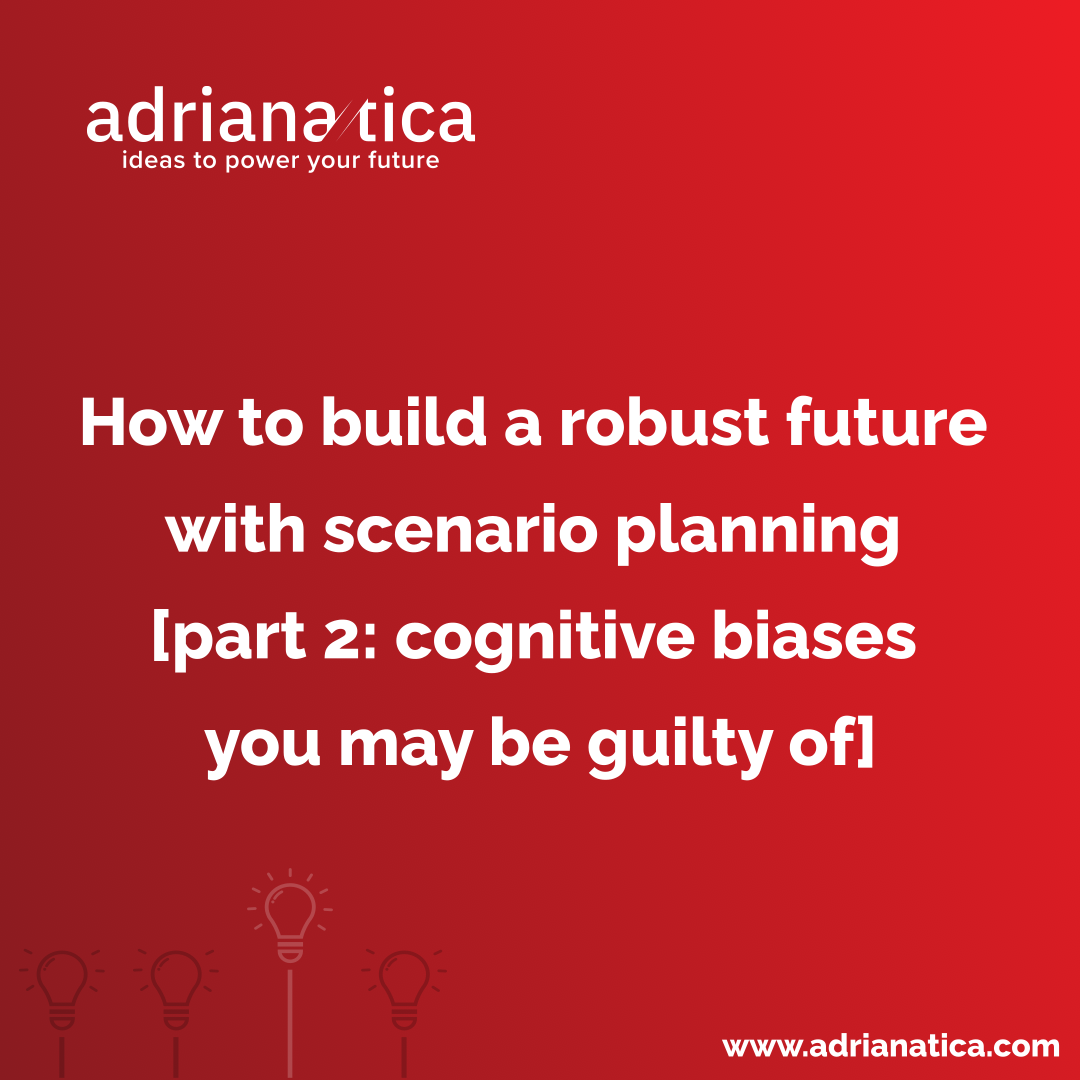
Last week, we talked about scenario planning and how it can help you build a robust and resilient future. If you missed the issue, you can read it here.
This week, we’re discussing one of the biggest limitations of scenario planning: the cognitive biases and heuristics that prevent us from creating insightful and future-proof scenarios.
You may recognize your thinking patterns in some of these. You don’t?
You’re biased.
I don’t mean this as an insult — we’re all biased because we need to be. A cognitive bias is a shortcut that enables us to process new information through the filters of our personal beliefs and experiences. It’s a coping mechanism of sorts, and a very useful one because it helps us process large amounts of information faster.
Psst, my subscribers read this before you did. Want to be the first to see analyses and roadmaps like this one? Subscribe to Ideas to Power Your Future and get them in your inbox every Thursday.
The trouble with cognitive biases is that they’re often irrational. When we rush to judge, the result is far removed from the objective reality. Due to inherent holes in our memory and attention span, we get seduced by information that’s presented in an attractive manner, irrespective of whether it’s correct or not.
Cognitive biases may have saved our ancestor’s life: when you’re hunting with nothing but a spear and you hear a majestic roar, you RUN. You use your past experience filter to quickly determine if that roar came from a lion or from a fellow hunter who’s feeling playful today.
There’s no time to analyze everything and dig for accurate information. You RUN because it’s safer that way. Do not pass GO, do not collect $200, just save your life.
However, lions don’t roam freely around our offices or homes anymore — at least in most of the world. You don’t have to make split-second decisions to save your life anymore.
Quite the opposite: you need to take the time to critically analyze every piece of information to save your business. In scenario planning and business strategizing in general, cognitive biases can make or break your future.
Daniel Kahneman, Nobel prize winner for research on the effect of cognitive biases on human choices, notes that nothing is foolproof — not even the most informed decisions, and that no one is infallible — not even the most experienced and rational managers.
Being aware of your biases won’t prevent them from popping up every once in a while. But it will make you acutely conscious of the limitations of your plans. So let’s dig into the most common cognitive biases.
Availability bias
According to Tversky and Kahneman (1973), availability bias is a heuristic that prompts you to make a decision based on examples, information, or recent experience that’s more easily available, even though it may not be the best source.
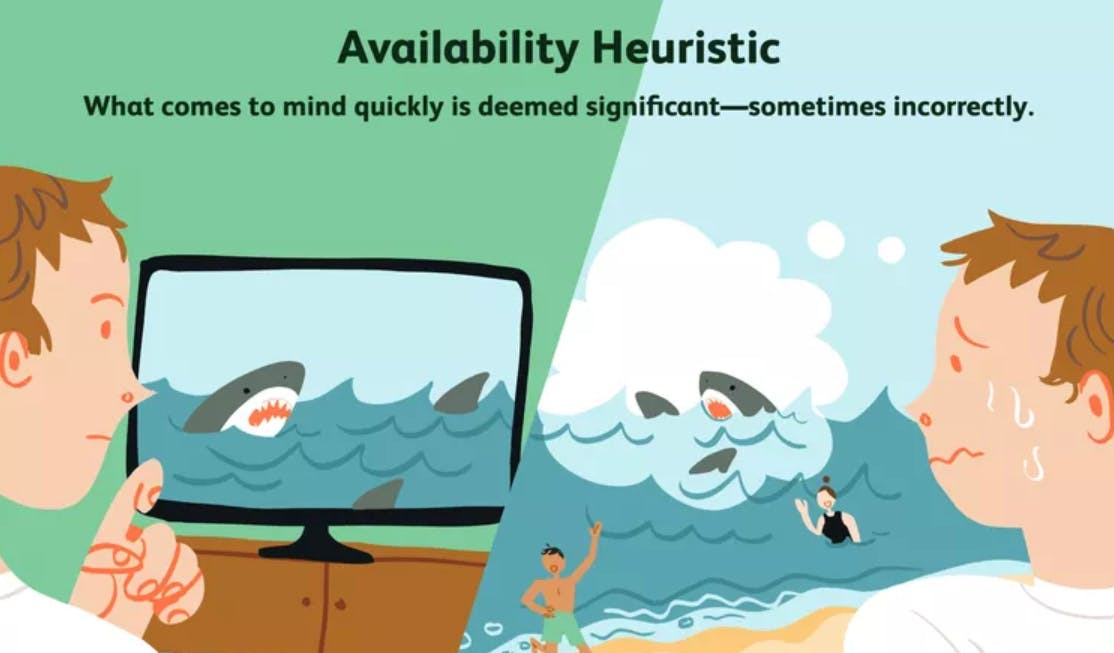
A good example of availability bias is governments’ propensity to prepare for the last disaster. The recent tragedy in Turkey and Syria, the earthquake that claimed over 15,000 victims thus far, prompted a lot of talks about preparedness for such disasters.
Similarly, when a shark attack happens, the media discusses it for days, and government authorities are continuously asked about their plans to prevent new attacks.
These rare occurrences stay with us longer than other, more probable risks because they are more recent AND more shocking.
Availability bias in your mind: stories are more memorable than disjointed facts. This is why most cultures teach us about values through fables, stories, myths, and proverbs. If you catch yourself too enthralled in a recent story that got a lot of media attention, stop and analyze.
When planning the future of your business, you may feel tempted to give more weight to recent hurdles. I’ve seen a lot of plans that include another pandemic and worldwide lockdowns in upcoming years.
The same goes for an economic crisis that mimics the 2008-2010 one.
While these are both possibilities, they are improbable. Add them as footnotes to your plan, not as central events. Distinguish between them: a new economic crisis is more probable than a new pandemic, but it won’t replicate the last one. Remember that not all risks have the same weight.
Action bias
As the name suggests, action bias is the heuristic that pushes us to take action too soon. It often stems from the pressure to act — very prevalent in the business world, or from over-confidence — most leaders need to project confidence, so they often make rash decisions to help them feel and look in control.
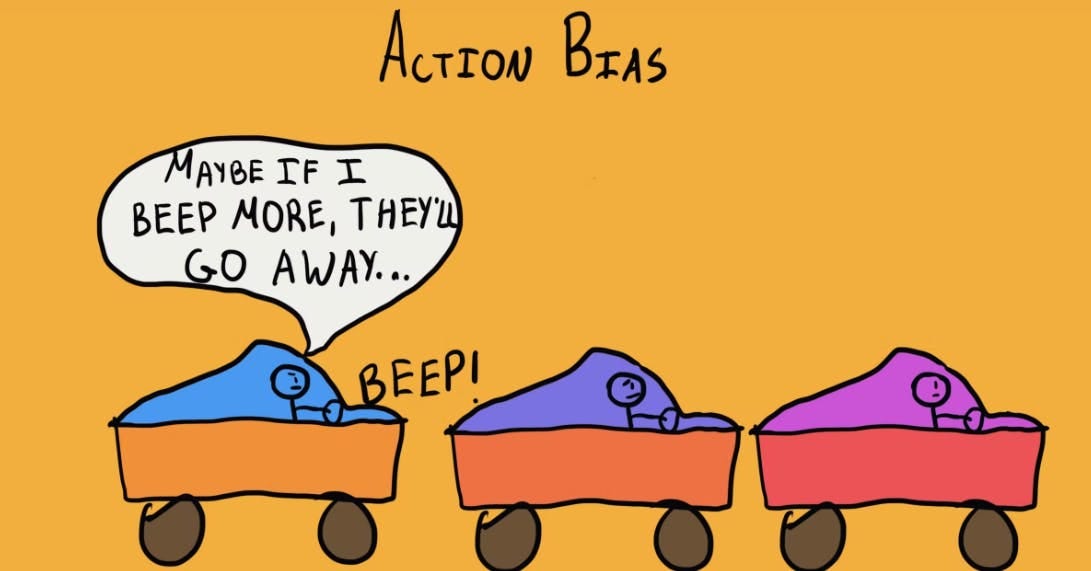
For example, if your competitor has launched a new product, you will feel tempted to do the same. Are you prepared for a launch? It doesn’t matter! You will still organize meetings, set a fire under your R&D department, and prepare the quickest launch in history.
Sitting and waiting something out is pure torture for the human brain that’s designed to do something, anything. But this imperfect heuristic can cause more harm than good. Blaise Pascal said it best:
“All of humanity’s problems stem from man’s inability to sit quietly in a room alone.”
Action bias in your mind: feeling tempted to act NOW with little advance preparation? Create two different scenarios based on the consequences of both action and inaction. What do they each result in? Can you see a massive benefit from springing into action right now? If not, wait it out.
Optimism or over-confidence bias
Close your eyes for a second. Where do you see your business three years from now?
It’s doing even better than today, right? It is perhaps not only self-sustaining but a front-runner in its industry, scaling healthily and making you one of the most respected leaders in your field. The phone rings — it’s Jeff Bezos asking you for advice on how to scale Amazon as fast as you have scaled your business.
OK, maybe I overreacted a bit with the Jeff part (of course he doesn’t have your number — he’d wish!). But I’m sure you’ve seen your business progressing and faring much better within three years.
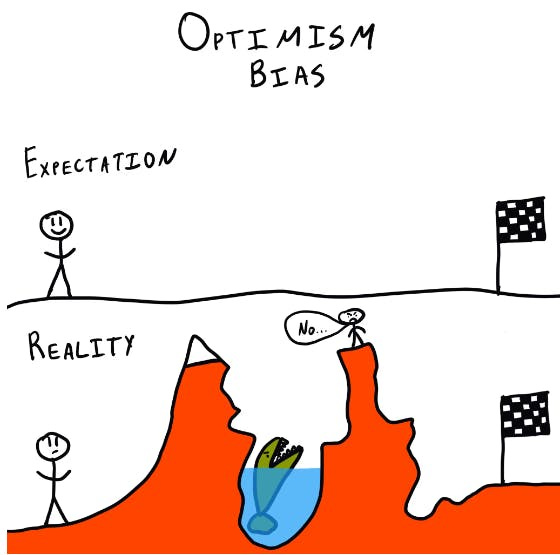
It’s because optimism is built into our brains. It is arguably the most extraordinary defense and coping mechanism we have. We have to see the world through rose-tinted glasses because otherwise, we’d stop fighting, trying, exploring altogether.
Didn’t get to do much today? It’s OK, tomorrow’s another day — a better one.
Optimism bias may lead you to make bad decisions in your personal life by encouraging risky behaviors like smoking or overeating or by making you ignore the potential of unwanted outcomes.
In business, it gets even murkier.
Leaders are naturally confident. Add over-confidence and excessive optimism to the mix and you’ve got the perfect recipe for uncannily positive scenarios about the future.
Optimism bias in your mind: when you’re looking forward to a positive outcome, you overestimate the likelihood of conjunctive events i.e. events that must happen in conjunction with one another for your outcome to be possible.
For instance, for your next product launch to be successful, you imagine that the economy will not take a turn for the worse, while your competitors’ business will. You need both of these things to be successful.
This is a bit of a mind-bender (hence, its prevalence): the probability of a series of events happening exactly as we need them to is MUCH lower than the probability of a single occurrence.
If you ignore this probability, you will seriously underestimate the effort, time, and budget you need for a successful product launch.
Does the scenario you crafted plot an other-worldly smooth road to success? Then it’s time to create a counterpart for it. Check your availability bias too: you may have relied excessively on top-of-mind information and ignored more obscure but more probable risks.
Confirmation bias
Our mind naturally gravitates towards cherry-picking facts and ideas that cement our own beliefs and values. This is confirmation bias.
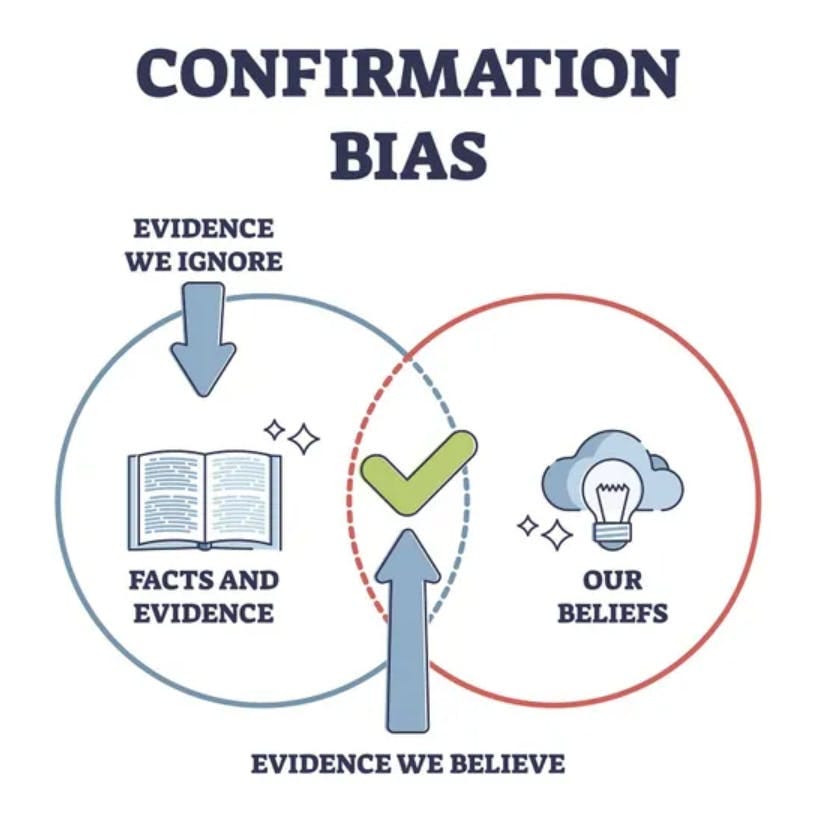
It explains why two people with opposing views can look at the same piece of evidence and feel validated by it. They both see only what they want.
Here’s a common example: the CEO of a company has a revolutionary idea for a product. He asks his team to conduct research for product-market fit to validate his idea.
This approach is wrong from the get-go because it uses a seemingly scientific approach incorrectly. As the team launches into surveys, focus groups, and market analyses, they do so knowing what their boss wants.
The results will be inherently skewed.
Moreover, confirmation bias can lead to groupthink, another heuristic where entire teams only take into account data and information that suits the beliefs of the majority.
Confirmation bias in your mind: I often find myself too attached to my own ideas. If you do too, the trick I use to avoid confirmation bias will come in handy.
Let’s say I want to invest in company X on the stock market. Searching for “company X past performance” or “is company X a good investment” is a sure recipe for confirmation bias.
So I do the exact opposite: I use search phrases like “why is company X a bad investment” or “financial problems at company X”. It’s not a foolproof method, but it helps balance things out in my mind.
In scenario planning, I encourage you to embrace diversity. Look for divergent points of view from your team and treat them all equally seriously. Consider ALL the data, not just the one that builds up your product idea or your idea for a perfect future. Admit when you were wrong.
[Another bias you may want to look into when building future scenarios is something I’ve already tackled at length, survivorship bias.]
Cognitive biases take our rational reasoning hostage. They cause us to make decisions using imperfect heuristics because weighing up all the facts is cumbersome, time-consuming, and very challenging to our egos.
But do you know what’s even more cumbersome, time-consuming, and very challenging to our egos? Badly laid plans i.e. the result of letting cognitive biases get in the way of reason.
This is by no means an extensive list of cognitive biases, but it’s a start in helping you recognize flawed thinking patterns.
That’s it from me today! I hope this issue of Ideas to Power Your Future helps you make future-proof decisions not more easily, but better.
Here to make you think,
Adriana
P.S.:
😃 Loved this email? Forward it to a friend!
☹️ Hated this email? Forward it to an enemy!
____________________________________________________________________________________________
Need me in your corner? There are three ways I can help you:
- Get my product launch email templates that sell: 5+1 emails you can send to your list in 45 seconds.
- Prepare your business for the future with my Trend Analysis and Forecasting service.
- Get content or copy that converts AND ranks. My digital marketing agency is here.
Connect with me on LinkedIn or Twitter.
